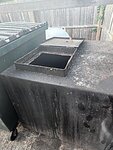

In recent months, numerous Bucks County restaurants, including the Brick Hotel, Captain Bob’s Seafood, Faraco’s Pizza, Washington House and Rossi’s Pizza have been targeted by thieves, and what they took might come as a surprise. It wasn’t cash or credit card information. No, the crooks were after their cooking oil. Used cooking oil.
On Sunday, a botched theft from the Brick Hotel in Newtown caused a cooking oil spill in the Borough Hall parking lot that drew the Department of Environmental Protection, Newtown Emergency Management and an environmental service to clean up the mess.
While most of us wouldn’t place a tangible value on restaurants’ used cooking oil, the oft-called “liquid gold” is a highly lucrative product when recycled and repurposed, and Bucks County establishments are part of a growing national trend that dates back years. “Yeah, it happens all the time, it’s been five years or even more,” said one local proprietor.
What makes used cooking oil so valuable?
As government incentives to produce renewable energy drive a push toward nonfossil fuels, the demand for alternatives has increased dramatically. One of those products — biodiesel — is a clean-burning alternative to petroleum-based fuels. It is recycled from used cooking oil.
Using biodiesel fuel helps many corporations meet the stringent emission standards enforced by The Clean Air Act. Think of the voluminous fueling needs of UPS and FedEx delivery vehicles, or the vast fleets of planes across the airline industry and you get a picture of the depth of demand for biodiesel.
Since biodiesel can be used in existing diesel engines without modification, this fuel is quickly becoming one of the fastest growing alternatives in the world. That statistic has energized considerable black market interest as well.
Bob Dunlap Jr., the co-owner of Captain Bob’s in Quakertown, concurs that this feels like a well-organized operation.
“We seem to be on a regular route of some type,” he said. “That’s what they do — hit one restaurant after another.”
Washington House’s co-proprietor Elayne Brick recently said she lost over 1,200 gallons of oil and her business was burglarized for the first time in her 37 years of operation.
With their nearly endless supply of used cooking oils, most restaurants and fast-food venues contract with one of 72 U.S.-based waste oil collection companies. They will regularly pick up cooking grease, provide storage vats with lid locks and even a small rebate check.
Restaurants are paid an average of 28 to 30 cents per gallon for their oil. These checks may not seem large, but for the thousands of smaller mom-and-pop concerns, they add up over time.
One legitimate cooking grease collection company is Buffalo Biodiesel Inc, founded 18 years ago by its president, Sumit Majumbar. It collects used oil from approximately 18,000 customers across 12 states, including Pennsylvania, and then sells it to refineries.
In a recent interview with the Herald, Majumbar said oil vat break-ins are already up 30% from last year, and he expects this to go up to 50% in 2023.
The thefts have cost his company millions of dollars.
“It’s ballooning,” he said. “It’s wiping out a third of our business. To put that into hard numbers, it’s $10 (million) to $15 million a year.”
And that doesn’t even include the cost of repairing damaged oil tanks and seals.
Partly due to the United States’ re-entry into the Paris Accord for Carbon Emissions Reduction, and partly due to higher oil prices, oil thefts have increased exponentially in frequency and sophistication.
Oil collection company officials are frustrated by what they see as a lack of serious local, state and federal deterrence. Thieves, they say, are rarely apprehended, and when they are, their cases are often a low priority for prosecutors.
Current bail laws in states like New York and Pennsylvania make it difficult for the courts to hold onto defendants. Too often, case after case gets kicked down to a misdemeanor or less.
“In most cases, criminals are getting a slap on the wrist. The police still do not prioritize this type of crime,” said Majumdar.
There have been indictments and even prosecutions that have provided a critical snapshot of the scope of the organized networks local thieves play into — black market networks that operate in a cash-only universe.
Notably, a grand jury in Northampton County indicted 21 members of an interstate operation involved not only in grease theft but also in money laundering across at least four U.S. states.
These indictments have opened Majumbar’s eyes to the emergence of a different breed of career criminal involved in the grease theft racket — those who engage in money laundering while selling to oil refiners at a profit.
There are glimmers of hope when waste collection companies see promising reports such as the New Jersey Attorney General’s move to actively pursue more leads of interest. In time, Majumbar holds out hope for a more cohesive point of attack, such as multi-state investigative commissions.
In Pennsylvania, reports of oil thefts that have crossed county lines triggered Luzerne County District Attorney Samuel Sanguedolce to publicly state he has become convinced many of the oil thefts plaguing Pennsylvania meet his definition of an organized crime network. He has referred multiple cases of oil theft to the Pennsylvania State Attorney General’s office for further investigation.
“This is by no means a homegrown issue,” said Majumbar. “We’ve learned addressing local social and journalistic media outlets in the states we service is one of the key drivers in building more awareness, educating consumers and gaining law enforcement traction for more prosecutions.”
Join our readers whose generous donations are making it possible for you to read our news coverage. Help keep local journalism alive and our community strong. Donate today.